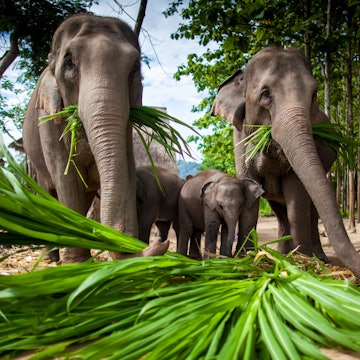

A woman with a hat walking along a shopping street in Bangkok
A ban on single-use plastic bags went into effect in Thailand’s major stores in the new year, the first phase in a plan to rid the country of them altogether by 2021, according to reports.
The campaign to get shoppers to bring their own reusable bags grew in popularity last year after various animals “were found dead with plastics in their digestive systems,” Reuters reported on 1 January, citing the government’s claim that plastic-bag use dropped by some 5765 tonnes in 2019 thanks to heightened public awareness.
“Thailand was ranked sixth among the world’s top countries that dump waste into the sea,” said Minister of Natural Resources and Environment Varawut Silpa-Archa. “During the past five months, we were down to 10th ... thanks to the cooperation of the Thai people.”
Though 58% of people strongly support the ban and an additional 23% somewhat support it, according to one recent opinion poll, shoppers are still adjusting to the new reality – and they’re adapting in exceedingly creative ways. In the first week of the new year, a Facebook album detailing the offbeat ways in which shoppers are getting their goods home went viral. There are reusable bags, yes, but also suitcases, wheelbarrows, woven baskets, buckets, even inverted parking cones and a rod bearing clothes hangers with snacks clipped to each one.
"People always find a way to be silly and have fun,” Bangkok artist Pimvipar Upatampaganon told NBC News
According to Greenpeace, more than 300 endangered marine animals in Thailand die from consuming plastic waste and being caught by fishing gear per year. “While 60% of marine animals, specifically dolphins and whales, die from eating plastic waste, 70% of sea turtles die from plastic waste that bind their neck and body,” the organisation noted in August.
The Bangkok Post reported this week that Thailand’s aim is to ban the seven most common ocean offenders by 2025, including bottle cap seals and disposable bags, cups, and straws. “The policy is projected to eliminate 45 billion single-use plastic bags a year, or 225,000 tonnes, from incineration or landfills,” wrote Nareerat Wiriyapong for the paper.
Varawut told Reuters that eliminating the plastic bags used at fresh markets and in rural areas would present the initiative’s biggest challenge. “It’s not going to be easy to change the way of thinking and behaviour of those people,” he said.
Still, they have no recourse but to try. As Dr Thon Thamrongnawasawat, a marine biologist who helped the government formulate its plan, told the Singapore Times, "The ban is the only way we can tackle the issue.”
You might also like:
How to reduce your use of plastic on a trip
The world's plastic wastelands documented by conservation photographer
Take your Thailand trip with Lonely Planet Journeys
Time to book that trip to Thailand
Lonely Planet Journeys takes you there with fully customizable trips to top destinations–all crafted by our local experts.

























